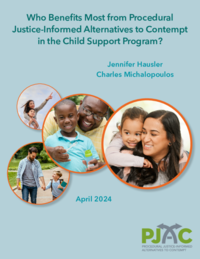Who Benefits Most from Procedural Justice-Informed Alternatives to Contempt in the Child Support Program?

When a child does not live with both parents, the parent with whom the child does not live is known as the “noncustodial parent.” The noncustodial parent may be obligated to pay child support to help with the costs associated with raising the child. However, most parents receive less than the amount they are owed. Parents who do not make their child support payments can be subject to enforcement measures that might lead to arrest or jailing, but there is little evidence that such actions lead to increased child support payments.
The Procedural Justice-Informed Alternatives to Contempt (PJAC) demonstration tested a different approach to improving child support payment compliance. Developed by the federal Office of Child Support Services, it integrated principles of procedural justice (the idea of fairness in processes) into enforcement practices in six child support agencies as an alternative to standard contempt proceedings. With oversight from the Georgia Division of Child Support Services, MDRC led a study of the model’s effectiveness in collaboration with MEF Associates and the Center for Justice Innovation.
PJAC enrolled noncustodial parents who were about to be referred for civil contempt of court for not meeting their child support obligations even though a child support agency had determined they had the ability to make payments. These parents were assigned at random to a PJAC services group or to a business-as-usual group. As described in earlier reports, the evaluation found that PJAC substantially reduced civil contempt filings but overall did not increase child support payment compliance or regularity (as measured in the evaluation). However, it is possible that some groups of enrolled parents were more engaged with PJAC’s case managers or that the impacts of PJAC on child support outcomes were more positive for some groups of parents. This report investigates whether either of those things could have been true. The results indicate the following:
- Parents who had higher recent formal earnings, had made some recent payments, had higher order amounts, or had simpler cases were more likely to engage with PJAC case managers, and PJAC had greater impacts on payments and child support debt for those parents. “Recent payments” includes measures of the total amount paid, the proportion of orders paid, and payment regularity. The research team considered parents to have simpler cases if they had shorter histories with the child support agency, owed current support on all cases (as opposed to having some cases for which they only owed child support debt), had lower amounts of child support debt, and had no previous referrals for civil contempt.
- Combining parent and case characteristics reveals substantial differences in engagement with PJAC case managers and differences in PJAC’s impacts on payments and debt across parents with different levels of recent earnings, recent payments, and case complexity. For example, parents with higher earnings, some recent payments, and less complex cases were up to 29 percentage points more likely to have had a successful contact with a case manager than other parents. In addition, for those parents, PJAC increased the proportion of obligations paid by about 21 percentage points more than it did for other parents.
The results suggest that, at the point of contempt referral, the procedural justice approach may work best with parents with higher formal earnings, some recent payments, higher monthly order amounts, and less complex cases. Those findings do not mean procedural justice should not be used with other parents, but additional support might be needed to help parents with limited earnings meet their obligations.






